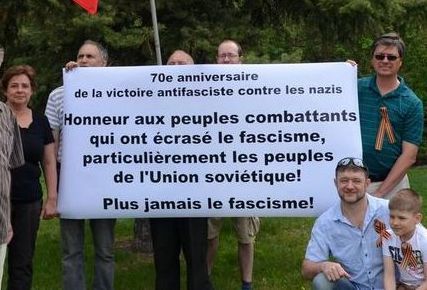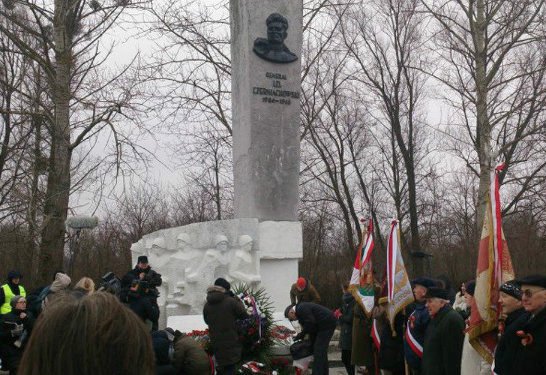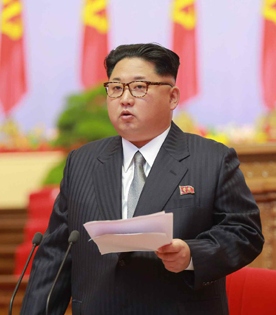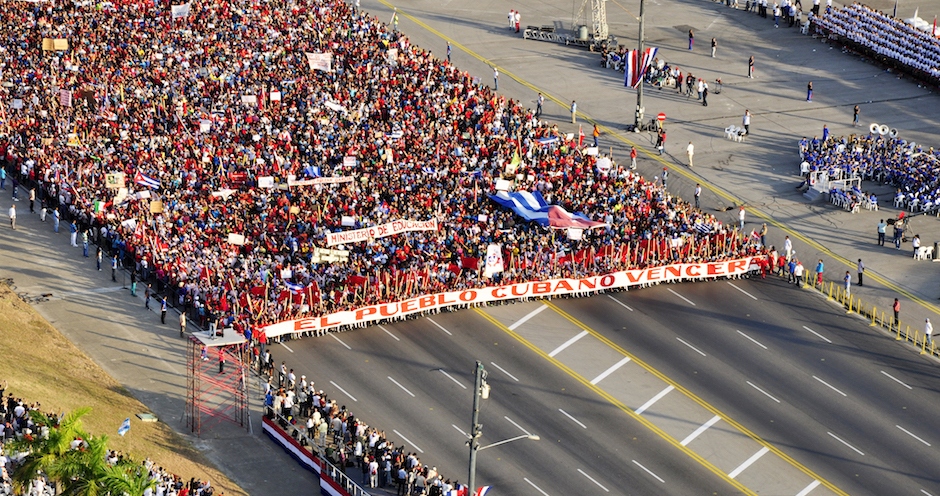
|
May 7, 2016 - No. 19 Reorganization of The Internationalists An Historic Event
in the
Oil
and
Gas
Workers
Left
to
Fend
for
Themselves Reorganization of The Internationalists An Historic Event in the Political Life of Canada
May 7, 2016 marks the 48th anniversary of the reorganization of The Internationalists into a Marxist-Leninist youth and student organization. The Internationalists, the precursor organization to the Communist Party of Canada (Marxist-Leninist), was founded in Vancouver on March 13, 1963. The reorganization of The Internationalists, under the leadership of its founder, Comrade Hardial Bains, took place in Montreal from May 7 to May 25, 1968, a development of historic import to the political life of Canada. It marked a crucial step towards the creation of CPC(M-L) as the party of the Canadian working class, a revolutionary party capable of and dedicated to providing the struggles of the working class and people with the consciousness and organization they require to win victory. The work of The Internationalists under the leadership of Comrade Bains sorted out the crucial issue of who decides as it pertains to the political organization of the working class and its leading role in the society and the indispensable role of consciousness and organization in the mobilization of the people to participate in finding solutions to the key problems facing the society. In an article entitled "Paying First-Rate Attention to the Need of the People for Consciousness and Organization," Comrade Bains points out the living legacy of The Internationalists: "Besides other things, in dealing with the problems of consciousness and organization, The Internationalists adopted the principle of collective work and individual responsibility, that every member has the duty to not only implement the decisions agreed upon but to also participate in arriving at them. This insistence that they must participate in arriving at decisions was considered not just a right but a duty as well. It put the individual at the centre of all developments and the organization as a means of achieving them, thereby establishing a dialectical relationship between the individual and the collective, between form and content. "[...]It was a historic moment of departure from the building of organizations on the basis of old definitions, to building them on the basis of the present and modern definitions. It became profoundly clear that The Internationalists as a political organization could only develop on the basis of political unity and political initiative, as manifested in concrete terms by their line of action with analysis and in defence of their immediate and strategic aims. Such aims were set according to the demands which arose from those conditions, for the harmonization of the general interests of society with those of the collective and individual, placing in the first place the role of the masses in ensuring that it happens.[...] "The Internationalists created another form consistent with the aim of providing the class with consciousness and organization. This was the form of mass democracy, also known as the method of mass ideological and mass political mobilization. It is the method of seeking the opinions of the masses in the course of work. Seeking the opinions of the masses was not an option but an obligation to the mass activism. It was the only reliable basis for the realization of any task set for the period. Bourgeois formalism, the method of spending millions of dollars by using the most modern techniques to confuse the people, gossip, character assassination, etc. were replaced with involving the people in discussion. What was to be done, how and when, emerged as on-going work under all conditions without exception. "For The Internationalists, work and mobilization constituted two categories of a single whole, interdependent on each other and on everything else. Action with analysis had the same relationship. The starting point for The Internationalists was always work, as demanded by the concrete conditions of the time. "Besides the method of mass democracy, The Internationalists carried out the work of mobilization at various levels, ensuring that all problems inside or outside the organization were sorted out on the basis of advanced positions, through criticism and self-criticism and by always keeping the aim of unity in first place. Struggle was never separated from either the on-going task of strengthening unity or from the aim of realizing the immediate aims set for the period or at the cost of the strategic aim. The Internationalists placed struggle in first place. This meant putting the entire consciousness and organization in the service of the class struggle as the only basis of development in society. How should class struggle be waged and against whom and when were the most important questions which The Internationalists dealt with, on the basis of the keenness and seriousness they required. It is for this reason that everyone was called upon to participate in arriving at decisions not just as a right which belongs to them but also as a duty demanded from them by the organization.[...] "Finally, The Internationalists provided forums to the people, both internal as well as external, private as well as public, for their mobilization. Basing the organization on the principles of democratic centralism required The Internationalists to have a leading line all the time, which is presented to the masses all the time, ensuring that their level of consciousness and organization are not lowered to that of the bourgeoisie.[...] "After a period of less than two years of vigorous all-round political activity from May 1968 to March 1970, it was analyzed that all the material and technical conditions were ready to found the Communist Party. The required theoretical and political work and the organization as their integral part were ready for the founding of CPC(M-L), declared in a public meeting in Montreal on March 31, 1970." "This entire work to involve everyone in the decision-making plan meant that the entire work always had to be based on the people according to the concrete conditions of the period. If the working class is to lead everyone in fulfilling its historic mission to create a new society, people's right to make decisions must be recognized as must the demand that so doing must be considered a duty as well."
 At this time, the neo-liberal anti-social offensive is creating havoc for the people. There is an all-sided assault which seeks to deprive the people of their ability to build a political movement to realize their striving for empowerment. This includes an attempt to deprive Canada itself of a forward-looking aim and nation-building project. It denies the very existence of the working class as a class with its own aim and political program, consciousness and organization. Under these conditions, the importance of the principles of building and consolidating organization elaborated by Comrade Bains and embodied in the work of CPC(M-L) cannot be overemphasized. In their absence, working out and achieving the pro-social aims of the working class and people will not be possible. By working out and then basing themselves on these principles, The Internationalists in their day provided themselves with the capability to meet the needs of the times. So too today, by applying these principles, Party activists and the working class are also able to meet the needs of the times and rise to any occasion. Oil and Gas Workers Left to Fend for Themselves Who Can Unemployed Workers Rely On?Before the devastating forest fires wreaked havoc on Fort McMurray, a report on the forecast for the Canadan oil and gas sector concluded that 24,000 more workers directly employed in the Canadian oil and gas sector will be fired or laid off in 2016, in addition to the 30,000 already laid off or fired. Financial Post carried a headline,"Oil and gas sector to shed 24,400 more jobs in 2016, says new report." This dismissive language, suggesting that the industry is simply getting rid of something it does not need, pretty well sums up the outlook of the report prepared by PetroLMI and funded by the federal government and the Canadian Association of Petroleum Producers (CAPP).[1] The "ripples" throughout the economy have already turned into huge waves. There are 194,000 unemployed workers in Alberta, part of the million Canadian workers out of work. In addition, construction, manufacturing, and transportation related to oil and gas are being particularly hard hit. For example Canadian Pacific alone says it will cut 1,400 jobs this year. As major oil sands projects are completed, these sectors will likely be further devastated. Why, workers want to know, is this not considered a national emergency which requires immediate action so that those affected are not left to fend for themselves and EI is available to all unemployed workers. The Liberals have an unpaid debt to unemployed workers. It was the Liberal government of Jean Chrétien which stole $48 billion from the EI fund and put it in general revenues to pay the moneylenders. That same government imposed new regulations making it harder to get EI and cutting benefits. This theft continued with the Harper government which absconded with $1.8 billion from the EI fund to claim a "surplus" budget. The report and its funders reveal themselves to be without any concern for the hardships faced by the workers. Instead everything is viewed from the outlook of the owners of capital. The focus is how to increase profitability by reducing the claim of workers on the added value they produce. To this end the report applauds all "cost cutting" measures, dismissing the workers who are the actual producers as a "cost" to the owners of capital. It considers it terrific news that most companies in the oil and gas sector have imposed wage freezes or cuts, reductions in benefits, bonuses, car allowances, camp accommodation, and travel expenses. Another piece of "good news" is that companies plan to produce more with fewer workers. Yet another is that increased oil prices will permit innovation to further reduce the number of workers employed through automation. What about the risk to the workers and their families of years of unemployment? What about the destruction of the productive forces? What about the risk to the environment of 37,000 orphaned and inactive wells across Alberta? Thousands of unemployed workers with the skills needed to clean up these wells are available and out of work. Why are governments not insisting that the oil and gas monopolies fulfill their obligations now and put these workers to work. Instead, the Petroleum Services Association of Canada is arrogantly demanding that the federal and provincial governments establish yet another pay-the-rich scheme to let the companies off the hook and pay for cleanup from the public treasury. The federal government Sectoral Initiatives Program
funds
labour market studies like this one to serve the needs of the
monopolies. The aim is to serve, protect and grow the private
wealth of owners of capital and strengthen class privilege. The
real hardship and problems faced by the workers and their
families don't even enter the picture. More and more Justin
Trudeau will find that the unemployed workers are not going to be
silenced with feigned sympathy. How can workers rely on those who
don't share their problems and whose class privilege allows them
to treat workers as though they were disposable. A new direction
is needed and it is the workers themselves who are rising to the
challenge to find solutions. Note
|
| |
Incidence or number of times a topic was mentioned |
| Makes a suggestion with respect to the Memorial name/theme | 168 |
| Expresses concerns about the Memorial purpose | 144 |
| Requests that
Memorial project be cancelled |
139 |
| Comments about the design of the Memorial | 96 |
| Suggests other type of monument be built | 91 |
| Expresses concerns about use of federal funding for the Memorial | 88 |
| Comments about the scale/size of the Memorial | 53 |
| Comments about location of the Memorial | 51 |
| Other | 37 |
| Expresses support for the Memorial project | 25 |
| Expresses concerns about the survey/consultation itself | 9 |
|
Total |
901 |
It's clear that a significant number of people made their opposition to the project known and that these views were not considered. The Trudeau government's claims about openness and transparency and "listening to Canadians" are hollow indeed.
While the NCC Board of Directors voted to adopt the staff recommendation that land use for the monument at the Garden of the Provinces and Territories be approved, Chairman of the Board Russell Mills pointed to the irony that an identical motion to grant land use for the same area was approved by the Board in June 2011. "We are back to square one," he said.
Since that time it was the organized opposition of people from many communities in Ottawa which blocked the Harper government from imposing this monstrous fallacy on Canadians. This opposition must continue. This time it should include opposition to the Liberal government's fraudulent consultation process and claims that Canadians approve its scheme for the anti-communist monument. The Trudeau government has taken up from where the Harper government left off. It is a sordid affair which is far from over.[3]
Notes
1. Recommendations to NCC Board:
"THAT a Federal Land Use Approval be granted to Reserve a Site located
west of the terraces of the Garden of the Provinces and Territories as
identified in the Appendix 1 for the proposed commemoration "Memorial
to the Victims of Communism -- Canada, A Land of Refuge" for a period
of four years, subject to the following conditions:
"- The proposed commemoration must follow all requirements to be
defined by the Urban Design Guidelines currently under development by
the NCC;
"- No works related to the installation of the proposed commemoration
will be permitted until a separate Federal Design Approval for final
design, once developed, has been granted;
"- The location of the proposed commemoration must maintain an
appropriate visual separation from the terraces of the Garden of the
Provinces and Territories;
"- That the preparation and signature of the Federal Land Use Approval
document associated with this submission be delegated to the Executive
Director, Capital Planning Branch."
2. On December 23, Jean Sébastien Marier carried an item on ICI Radio Canada which said that the private financing for the monument to the victims of communism is in a sorry state. The article, translated from the original French by TML Weekly, follows.
***
Tribute to Liberty, the private group behind the controversial 'Monument to the victims of Communism' is having difficulty finding private donors to provide funding for the monument. This article is based on information obtained by Radio Canada through access to information requests. According to an agreement with Heritage Canada , Tribute to Liberty was supposed to raise $1.26 million for the project. The agreement required that $1.2 million be available for the minister by April 1, 2015.
According to notes of a meeting that was held on May 13, 2015, Tribute to Liberty had only raised $900,000. It is not clear how much was actually collected and how much were commitments. Radio Canada spoke with Ludwik Klimkowski by phone but he declined to provide up-to-date numbers on the financing.
Klimkowski said that his organization would have no problem attaining the new goal of $1.5 million announced a couple of weeks ago by Minister Joly.
The agreement between Heritage Canada and Tribute to Liberty, a copy of which was acquired by Radio Canada, states the organization would not be held responsible for any missing amounts in case their fund-raising campaign generates less than was expected. The document also confirms that both sides are committed to raising $1.5 million each for a total budget of $3 million which is $2.5 million less than the initial budget. Ottawa is also committed to absorbing the cost of the design.
Promises of contributors which are not coming through.
One of the cornerstones of the Tribute to Liberty proposal is the building of a commemorative wall which the organization intends to use to raise 1,000 donations of $1,000 each for a total of $1 million. Their website advertises that for $1,000 donors can have their name placed on the wall. An exchange of e-mails obtained by Radio Canada shows that the organization is having difficulty finding donors.
In one e-mail exchange in April 2015, between Alide Forstmanis, Treasurer of Tribute to Liberty, and Lorraine Pierce-Hull of Heritage Canada, it is stated that "only 481 names had been obtained for the wall," and Pierce-Hull adds that at this rate "you may reach 600 names but not 1,000."
Notes from a meeting on May 13, 2015, indicate that in fact the organization had actually confirmed only 300 names. In addition further e-mail exchanges between the same two people reveal that as of April 2015 money from only 4 of the 8 donors who pledged $100,000 each, had actually been received.
Minister announces a smaller monument in a different location.
On Thursday, December 17, 2015, Heritage Minister Joly announced that the proposed monument will be much smaller than what had been proposed last June. She also indicated that the government intended to consult the population. Furthermore the minister suggested that the project would be located in the Garden of Provinces and Territories across the street from the National Archives rather than near the Supreme Court building.
The final decision would be left to the NCC. Cédric Pelletier, a spokesman for the NCC was quoted as saying that "the NCC in its role as steward of federal lands and buildings in the capital, will give final approval for use of the land as well as for the design all throughout the process." He indicated that the NCC will also manage the construction of the monument and will also be responsible for the conservation, maintenance and management of the future monument.
To date the NCC has set aside $75,000 for the project. As for Heritage Canada, so far it has expenses of $370,000."
3. Further notes from NCC
meeting on April 28
"Proposed Schedule / Next Steps
"- Spring 2016: Multi-Party Project Agreement
"- Summer 2016: NCC leads preparation of Urban Design
Guidelines with
presentation to the ACPDR followed by revision and approval by the
Board of Directors
"- Mid-2016 to Spring 2017: PCH leads design competition,
concept development
and public consultation
"- Spring to Fall 2017: Design development with presentations
to ACPDR and
Board of Directors
"- Late 2017: Development of Tender Package, Submission to
Board of Directors for
Federal Design Approval"
71st Anniversary of the Victory Over Fascism
The Overthrow of the Imperialist System Is the
Only Guarantee
for Peace


April 30, 1945: The Soviet Victory Banner is first
raised over the German Reichstag in Berlin by Red Army soldiers,
shortly before the surrender of German forces in the city and the
decisive victory over the fascists on May 9, 1945. Photos from May 1
(left) and May 2. (RIA
Novosti)
On May 9, 1945 the anti-fascist forces of the world with the Soviet Union and communists of all lands at the head of the Resistance Movement declared victory over the Hitlerite Nazis. On this memorable day 71 years ago, fascist Germany acknowledged defeat and declared unconditional surrender.
|
|
The turning point of the war was the historic Soviet victory at Stalingrad February 2, 1943 that concluded with the encirclement and surrender of a German army of 300,000 troops. This rout of the Nazi Wehrmacht, followed by a decisive victory at Kursk, began a powerful counteroffensive that drove the German Hitlerites steadily backward until the final demise of the Third Reich in Berlin.
Of great assistance was the Allied landing at Normandy on June 6, 1944 (D-Day), which compelled Germany to wage war on two fronts. Unable to withstand the joint blows of the Red Army and Allied forces, the German troops quickly fled back to their own lands where they finally capitulated unconditionally.
As soon as Hitler was crushed in Berlin and even before the people could breathe a sigh of relief and enjoy the heroic success of their accomplishments in the anti-fascist war, the Anglo-American imperialists began their Cold War to "contain communism." This campaign attacked and stifled the democratic rights of the people. It was directly aimed at preventing progressive change across the entire world. It targeted first western Europe where it imposed all-sided Anglo-American political, cultural, military and social arrangements on the peoples to stop communism but it also went after Africa, Latin America and the Caribbean, covert and not-so-covert wars and coups d'état in Latin America and so on and launched brutal campaigns of espionage and counter-revolution against the former Soviet Union and People's Democracies in eastern Europe.
As part of their attack on everything progressive, the
U.S. imperialists and their minions have deliberately falsified the
history of the Second World War. Today, the Red Army of that time is
caricatured as being similar to the army of Hitler, as if communist and
people's armies go about killing civilians and shooting prisoners. This
portrayal of the Red Army began with Goebbels and the Nazis themselves.
The imperialists relentlessly repeat all the old fascist accusations
against communism and especially J.V. Stalin who led the Soviet Union
and the worldwide victory against fascism. The most outrageous claims
are made that Hitler and Stalin are "the same" and that "both bear
responsibility for World War II," when it was the fascist states with
the connivance of the Anglo-Americans and the French that started World
War II, while the Soviet Union led the struggle to stop the war from
ever beginning and finally to end it.
What is the objective behind these falsifications? It could not be merely to discredit the enemies of imperialism posthumously because history cannot be rewritten in that fashion. Rather, it is to groom and egg on the fascist forces in the present, to give them every support to organize against the people in the here and now. The imperialists present to the world a totally fabricated falsehood called "Stalinism," suggesting this caricature is the same as its opposite, fascism. In fact, everything that is falsely blamed on the name and work of Stalin is exactly what the imperialists have been doing since the victory of the Great October Socialist Revolution in 1917 and the beginning of the Soviet nation-building project led by the working class to negate its exploiters and open a path for the emancipation of workers and oppressed people worldwide.
|
|
Throughout the Second World War, the overall Anglo-American strategic plan was to try to minimize their own military losses, then intervene when both Germany and the Soviet Union were exhausted. The deepest wish of the U.S. ruling elite was that Nazi Germany would smash the Soviet Union. The truth is that the rulers of the U.S. were very unhappy that the Red Army were able to turn back Hitler's forces at Stalingrad and reach Berlin and stop the Anglo-American imperialist forces. The U.S., with its British ally, could then create a post-war Europe that was to its own economic and political advantage. They launched operations, the main aim of which was not to help bring about a just peace. Instead, it was first and foremost aimed at trying to prevent the Soviets from playing the decisive role in winning the war against the Hitlerites, even though the Soviet Union had already played that role and had already won the everlasting acclaim of the world's people for its great accomplishments.
This was an imperialist dream that went back prior to the founding of the Soviet Union. In 1918 the U.S. and 14 other countries including Canada invaded the newly born Soviet Russia, hoping to destroy it before the revolutionary workers and peasants could consolidate their nation-building project. Even as the "peacemakers" talked in Paris in 1919, tens of thousands of Allied soldiers were waging a bloody undeclared war against Soviet Russia and the revolutionary workers and peasants of 14 other nations fighting to join together in a Union of Soviet Socialist Republics free from imperialist exploitation and war.
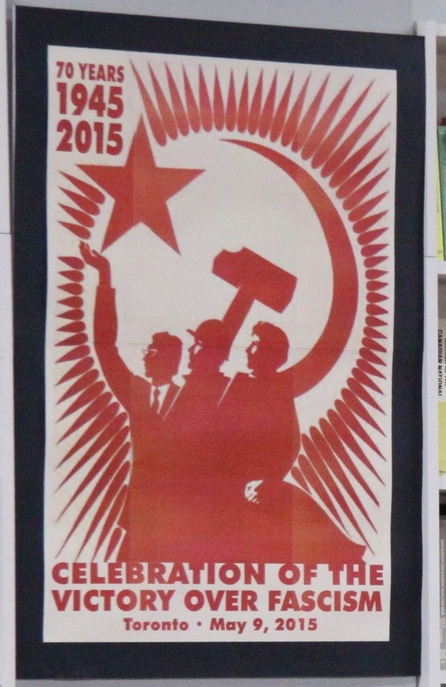 Following World War I, the
U.S. ruling class pursued a
policy
of using the contradictions among the European imperialist powers
to further its own empire building and to profit from and weaken
its European rivals, especially Britain and France. With the rise
to power of the German Nazi Party in 1933, the U.S. saw in Nazi
Germany a weapon to terrorize and dominate Europe and finally
destroy the socialist Soviet Union. To this end, powerful
monopolies in the U.S. such as Ford invested millions in Germany
to strengthen its military for the planned invasions and war.
Meanwhile, as the Nazis ruthlessly eliminated all opposition
within Germany and militarized all aspects of life, Britain and
France pursued a policy of conciliation and capitulation to
fascism, and similar to the U.S. prodded Germany to prepare to
march eastward.
Following World War I, the
U.S. ruling class pursued a
policy
of using the contradictions among the European imperialist powers
to further its own empire building and to profit from and weaken
its European rivals, especially Britain and France. With the rise
to power of the German Nazi Party in 1933, the U.S. saw in Nazi
Germany a weapon to terrorize and dominate Europe and finally
destroy the socialist Soviet Union. To this end, powerful
monopolies in the U.S. such as Ford invested millions in Germany
to strengthen its military for the planned invasions and war.
Meanwhile, as the Nazis ruthlessly eliminated all opposition
within Germany and militarized all aspects of life, Britain and
France pursued a policy of conciliation and capitulation to
fascism, and similar to the U.S. prodded Germany to prepare to
march eastward.
All the efforts of the Soviet Union to oppose Germany by signing a mutual assistance pact with Britain and France failed. Instead, Britain and France meekly accepted the German Wehrmacht's invasion and annexation of Austria in March 1938, paving the way for the signing of the infamous Munich Agreement six months later in September allowing Germany a free hand to occupy a major industrialized region of Czechoslovakia greatly strengthening its militarization and preparations for war. The Munich conciliation with fascism sealed the immediate fate of the peoples of Europe by giving Hitler the green light to invade other countries without a united opposition. The Soviet Union in particular was left on its own to prepare itself as best it could for the inevitable Nazi attack. As expected, 22 months later on June 22, 1941 Hitler's military invaded the Soviet Union along a 2,900 km front with over 4.5 million troops, 600,000 vehicles and tanks, 750,000 horses and thousands of aircraft. This barbaric invasion to crush the nation-building project of the Soviet working class and peasantry, annex their territory, seize their means of production and raw material and turn the people into slaves of the German monopolies was the largest military offensive in history. In the end, the resistance of the Soviet peoples led by Stalin and the Communist Party broke the back of the Nazi aggressors. Some 50 million people died and another 35 million were seriously wounded during the Anti-Fascist War with the peoples of the Soviet Union bearing the brunt of the casualties.
What is the main lesson of the Second World War?
In Causes and Lessons of the Second World War, Hardial Bains writes: "It is very important to understand that this entire propaganda on the question of the Second World War has an aim. Working people should not take it with folded arms because its object is to organize a fascist movement, to condone fascist aggression. If the Anglo-American bourgeoisie is successful in this, it will cause a disaster for the peoples of the world just as the Anglo-American policy caused the disaster of the Second World War. A repetition of this policy will bring the disaster of a Third World War. Our Party openly states that people should take the road of revolution. Our party will give the call for the overthrow of any government that participates in an imperialist and aggressive war. We have the right to do so in order to protect the people from the horrors of such a cataclysmic war. To protect the people from the horrors of inter-imperialist war is part of the tradition of the modern democratic movement, the entire struggle for the rights and freedoms of the people. The movement entrusts us with this stand. [...] The overthrow of the imperialist system is the only guarantee for peace. There is no other lasting way peace can be achieved. This is the lesson of the Second World War." (Hardial Bains, Causes and Lessons of the Second World War. Toronto: MELS, 1990)
Ghosts of the Past:
The Story of Red Army Captives in
Poland
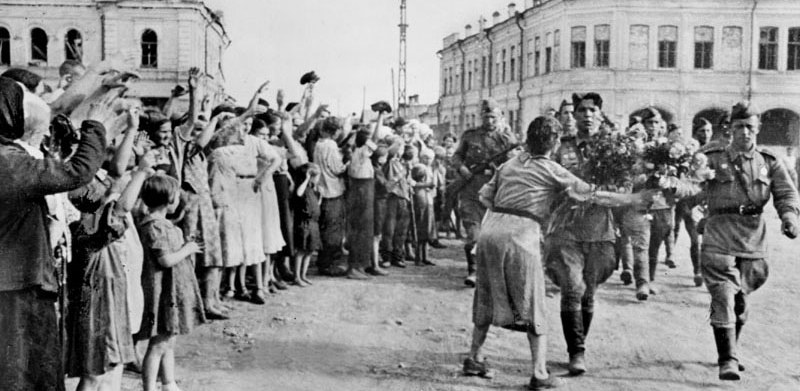
Soviet army greeted as it liberates Warsaw in 1945.
While the Polish government is preparing to demolish 500 monuments devoted to the memory of Soviet soldiers who died liberating Poland from the Nazi invaders, another disturbing historic episode comes to mind -- the story of tens of thousands of Soviet prisoners of war tormented in Polish captivity back in the 1920s.
Warsaw is attempting to rewrite Poland's history by dismantling hundreds of monuments devoted to the Soviet Army soldiers and their Polish counterparts who died heroically liberating Poland from the Nazi invaders.
This Orwellian-style approach aimed at controlling and manipulating the past has repeatedly proven ineffective, "for nothing is secret that will not be revealed, nor anything hidden that will not be known and come to light."
Poland 'From the Baltic Sea to the Black Sea'
|
|
It is well documented that thousands of Soviet Red Army prisoners of war (POWs) died from hunger, torture and mistreatment in Polish "death camps" back in the 1920s. "Death camp" is actually the phrase used by Polish Colonel Ignacy Matuszewski, who described the deplorable conditions in Polish detention centers in his report to First Marshall of Poland Jozef Pilsudsky, on February 1, 1922.
On March 18, 1921 Poland, Soviet Russia and Soviet Ukraine inked the Treaty of Riga that brought the Polish-Soviet War, unleashed by Warsaw back in 1919, to an end.
Jozef Pilsudski's military adventurism resulted in the seizure of substantial portions of Belorussian and Ukrainian lands by Poland.
It sounds as absurd as if modern-day Great Britain decided to regain control over its former North American colonies. However, Soviet Russia and its allied republics -- Soviet Ukraine and Belarus -- lay in ruins, exhausted by the Civil War and ongoing foreign intervention. In light of this, Warsaw leapt at the chance to fulfill its militarist plans, receiving at the time significant aid from France.
The terms of the Treaty of Riga were unsatisfactory to both sides, Canadian historian Michael Jabara Carley writes in his book Silent Conflict: A Hidden History of Early Soviet-Western Relations.
Indeed, Poland seized a territory of over 200,000 square kilometers with only 15 percent of the ethnic Polish population.
However, the Polish government had long been harboring plans to bite off more territories from the USSR and had no scruples about sharing its aspirations with Nazi Germany in the late 1930s.
"I spoke to M. Beck [Polish Foreign Minister] once more about the policy to be pursued by Poland and Germany towards the Soviet Union and in this connection again proposed Polish-German collaboration in this field" Nazi Foreign Minister Joachim von Ribbentrop wrote in January 1939.
These "from sea to sea" plans never came true, as Nazi Germany occupied Poland in September 1939.
Unspoken Story of Polish 'Death Camps'
Commenting on the issue of Red Army POWs taken prisoner by Poland between February 1919 and October 1920, Russian historian Oleg Nazarov notes in his recent article for Literaturnaya Gazeta (Literary Newspaper) that the Polish Army captured at least 206,877 Red Army soldiers.
Nazarov underscores that the figure is the result of scrupulous examination of Poland's Central Military Archive (CAW) documents, carried out by Professor Gennady F. Matveyev of Moscow State University.
The inhumane treatment of Soviet prisoners -- who died by the thousands due to unbearable living conditions, poor nutrition, torture and disease -- by Polish authorities was registered by Soviet and foreign journalists as well as representatives of the international Red Cross organization.
Nazarov quoted Red Army soldier V.V. Valuyev who escaped Polish captivity. Valuyev, captured by the Polish Army among other Soviet troops on August 18, 1920, recalled that the Polish military took away their uniforms, and severely beat those prisoners who protested against it; a Soviet Commissar was executed by Poles in front of other Red Army soldiers.
Then the POWs were sent to Tuchola concentration camp. The injured were placed in barracks flooded with other wounded Soviet captives. The Tuchola camp's authorities had not been treating injured Russian prisoners for weeks; as a result, their wounds were rotting and swarming with maggots. Up to thirty captives died each day in the camp.
Another hideous episode was documented by Polish military servicemen [that] transported about three thousand Red Army POWs from Kovel (modern-day Ukraine) to the Polish city of Pulawy. Exhausted and starving, the Soviet soldiers had not been fed for five days. Upon arrival at Pulawy they could barely walk. Those who were able to get out of railroad cars rushed toward the corpse of a horse lying near the rails and started eating its flesh.
Polish scientists are making attempts to understate the number of victims: Polish historian Zbigniew Klemens Karpus and his counterparts claim that "only" 18,000 Soviet detainees died in Polish concentration camps, while Col. Matuszewski's report shows otherwise.
"Especially in the camp of Tuchola about 22 thousand Red Army men died," Matuszewski reported on February 1, 1922.
Instead of rewriting history and wiping out bad and good memories, the nations should take it at face value.
"It is necessary to fully resolve all the difficult issues. It is painfully necessary to find out everything and move forward," former Polish president Lech Walesa told RIA Novosti in November 2015.
(Sputnik, April 2, 2016)
159th Anniversary of the First War of Indian Independence
Hum Hain Iske Malik,
Hindustan Hamara --
The Battle Cry
of
1857 to
Vest Sovereignty in the People
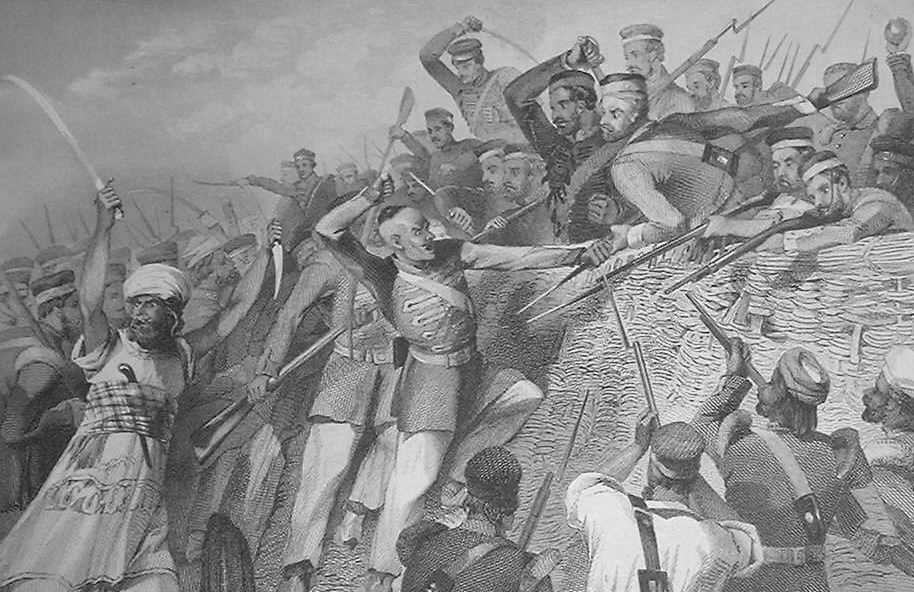
Engraving from the 1860s of scene from the First Indian War of
Independence.
The developments of the last hundred years and more have placed the agenda of people governing themselves as a problem to be solved and not just an aspiration of the people. In 1857 the people of India raised this demand -- Hum Hain Iske Malik, Hindustan Hamara -- We are the sovereign people of India, it belongs to us. Hum or We refers to the Praja, the people of India. It squarely put the issue that Hindustan belongs to the people of India. It is they who are sovereign and they themselves must decide how this Hindustan will be administered. They must govern themselves. It was a battle cry to vest sovereignty in the people and affirm this sovereignty.
Basing themselves on the traditions and aspirations of the past, in order to deal with the present, and build a new future, Indian people posed the problem that they must become rulers themselves if they are to have freedom, prosperity, security, enlightenment. They gave rise to a program, a set of arrangements that the victorious people will have between themselves. These arrangements took the form of various Firmans -- decrees -- issued by Bahadur Shah Zafar. They broke with the old Brahmanical and colonial notion of Yatho Raja, Tatho Praja -- according to which the Raja will determine the affairs of the Praja. This affirmation of their being and sovereignty gave rise to countless revolts against the British and their collaborators in Hindustan before and after the transfer of power in 1947. It continues to bring people in battle against the Indian state which is based on the empire building notions of the British colonialists.
This task of vesting sovereignty in the people, whereby people themselves become rulers without the mediation of any one, including the political parties, is one of the most crucial tasks confronting the Praja of Hindustan for the renovation and renewal of India. All over Hindustan, Praja, the people, are raising the demand, Hum Hain Iske Malik, Hindustan Hamara. They are calling for the affirmation of their collective being and making their claims that they collectively are the masters of their destiny, the destiny of Hindustan. It is they who must govern it and no one else. It is a necessary condition for their emancipation from all bondage. It is a claim that pronounces what is missing from the lives of people, that under the present system of governance, Hindustan does not belong to them, they are not sovereign and that Hindustan is under the control of others who are not part of Praja. Not only are they not part of Praja but they have usurped the sovereignty of the Praja by force. For this reason the claim -- Hum Hain Iske Malik, Hindustan Humara, affirms that we, the Praja, are the rightful masters of Hindustan. It is ours and no one else's.
This affirmation of the sovereignty of Praja calls into question all those arrangements that have been made by others, be they British, Maharajas, political parties or anyone else, ostensibly in the name of the Praja. It calls for the establishment of new arrangements, mechanisms through which the sovereignty of the Praja can be affirmed and exercised. It is a condemnation of all those institutions which the vested interests of the British and their collaborators, the Indian ruling circles have developed and imposed as a condition on the Praja in which the Praja is not ruling, governance is by someone else, by those who are not Hum. In fact governance is over and above Hum and against Hum.
Governance is to ensure that the claims of Praja, Hum, all of us, are not honoured. The solution to this problem posed by history and this condition of powerlessness is the creation of a new situation, a new power, by Praja: a Prajaraj, governance by Praja, where the claims of all can be honored by all. Hum Hain Iske Malik, Hindustan Hamara, is a call for the empowerment of all the peoples of India. Hindustan belongs to us -- those who toil in factories and fields, homes and hearths, mills and mines, schools and offices. We -- Hum -- must set the agenda for it. We must determine its direction. We must not allow anyone else to determine its direction. Anything that comes in our way must be swept away.
It is an affirmation of the age old wisdom and Taang of Rig Veda under new conditions, on a modern and higher basis that declares that it is the Praja that gives birth to Raj and Raja, that Praja is the foundation and creator of the seven organs of Rajya; that it is the Praja that is the very basis of governance itself.
Tam medhshu prathamam devayantirvisah up bruvate dasamaarih
(Desirous of many things the Praja should make him
the
leader of the sabha (legislature) who is the friend of all, who
is a person of knowledge, who wishes the well-being of all, who
is an able commander of the army which is endowed with the best
weapons and vehicles.)
Prajaavata vachsa vahinraasa cha huve ni sateeh devaih. Veshi hotramut potram yajatra bodhi pryantarjanitavasunaam
(In accordance with the words of the Praja, with knowledge, bring prosperity. Because of your constant effort to bring happiness to us, we praise you.) - Rig Veda
Hum Hain Iske Malik, Hindustan Hamara is a clarion call that this Praja no longer is content with just paying lip service to its illusion. This Praja has to be at the centre stage and not sidelined in order to deal with the problems of life and war. Without Praja being at the centre stage no problems of humanizing nature or society can be solved to serve the interests of all, to ensure everyone's Sukh and Raksha (Well-being and Security). Praja must rise to the occasion and establish once again, laying its claim, Hum Hain Iske Malik, Hindustan Hamara.
The present situation calls upon Praja to create mechanisms through which it can establish Prajaraj, actualize and exercise its sovereignty by negating all those institutions and mechanisms that have negated the sovereignty of the people. This Prajaraj will empower all members of the polity and honour their claims. The Communist Ghadar Party of India addressed its political program to lay this claim: Hum Hain Iske Malik, Hum Hain Hindustan, Mazdoor Kisan, Aurat Aur Jawan -- We the workers, peasants, women and youth; we are India. A program of action and appropriate organisations are required which activate the human factor/social consciousness to establish this Prajaraj, by uniting all those who are discontented with the present state of affairs and are deprived of their power by the powers that be. This program outlines the arrangements which must be made in practice amongst the various sections of the people. How will the well being of the workers be ensured? What measures will be taken to ensure the age old aspirations of the peasantry from want and hunger? What provisions will be made for the middle strata, students, youth, women, Dalits, nations and nationalities? What spiritual force must be further developed to deal with the problems of our days?
This program must put the Indian working class as the leader of all the oppressed people in the front ranks to establish this Prajaraj. It must not delay in giving rise to this Prajaraj for the renewal and renovation of India.
(Originally published in TML Weekly, Vol. 4, No.7, February 14, 1999.)
Note
The Events of 1857
Writing for the New-York Tribune on July 15, 1857, Karl Marx described the events in an article titled "The Revolt in the Indian Army." He wrote:
"On the 22nd of January, an incendiary fire broke out in cantonments a short distance from Calcutta. On the 25th of February the 19th native regiment mutinied at Berhampore the men objecting to the cartridges served out to them. On the 31st of March that regiment was disbanded; at the end of March the 34th sepoy regiment, stationed at Barrackpore, allowed one of its men to advance with a loaded musket upon the parade-ground in front of the line, and, after having called his comrades to mutiny, he was permitted to attack and wound the Adjutant and Sergeant-Major of his regiment. During the hand-to-hand conflict, that ensued, hundreds of sepoys looked passively on, while others participated in the struggle, and attacked the officers with the butt ends of their muskets.
"Subsequently that regiment was also disbanded. The month of April was signalized by incendiary fires in several cantonments of the Bengal army at Allahabad, Agra, Umballah, by a mutiny of the 3d regiment of light cavalry at Meerut, and by similar appearances of disaffection in the Madras and Bombay armies. At the beginning of May an emeute was preparing at Lucknow, the capital of Oude, which was, however, prevented by the promptitude of Sit. H. Lawrence. On the 9th of May the mutineers of the 3d light cavalry of Meerut were marched off to jail, to undergo the various terms of imprisonment to which they were sentenced. On the evening of the following day the troopers of the 3d cavalry, together with the two native regiments, the 11th and 20th, assembled upon the parade-ground, killed the officers endeavoring to pacify them, set fire to the cantonments, and slew all the Englishmen they were able to lay hands on. Although the British part of the brigade mustered a regiment of infantry, another of cavalry, and an overwhelming force of horse and foot artillery, they were not able to move until nightfall. Having inflicted but little harm on the mutineers, they, allowed them to betake themselves to the open field and to throw themselves into Delhi, some forty miles distant from Meerut. There they were joined by the native garrison, consisting of the 38th, 54th and 74th regiments of infantry, and a company of native artillery. The British officers were attacked, all Englishmen within reach of the rebels were murdered, and the heir of the late Mogul of Delhi proclaimed King of India. Of the troops sent to the rescue of Meerut, where order had been re-established, six companies of native sappers and miners, who arrived on the 15th of May, murdered their commanding officer, Major Frazer, and made at once for the open country, pursued by troops of horse artillery and several of the 6th dragoon guards. Fifty or sixty of the mutineers were shot, but the rest contrived to escape to Delhi. At Ferozepore, in the Punjaub, the 57th and 45th native infantry regiments mutinied, but were put down by force. Private letters from Lahore state the whole of the native troops to be in an undisguised state of mutiny. On the 19th of May, unsuccessful efforts were made by the sepoys stationed at Calcutta to get possession of Fort St. William. Three regiments arrived from Bushire at Bombay were at once dispatched to Calcutta."
198th Anniversary of the Birth of Karl Marx
The Working Class Holds the Name of Karl Marx
in the
Highest
Esteem
|
|
The name and work of Karl Marx continue to be among the most revered or despised during this entire period of the twentieth century. The bourgeoisie loathes his name and work with a passion, and even distorts it by presenting him as a liberal. The working class holds his name and work in the highest of esteem, while the labour aristocracy is extremely fearful of both.
Karl Marx was first and foremost a revolutionist. His discoveries of the general law of motion of society and nature, dialectical and historical materialism, and the specific law of the capitalist mode of production, the theory of surplus value, were worked out and presented to the world with the certain knowledge that without revolutionary theory there could be no revolutionary movement.
As a revolutionist, right from his earliest activities as a youth in the 1840s, Karl Marx was involved in the practical solution of the problems of revolution. He carried out the most energetic ideological and polemical struggles, and theoretical work to push forward the revolutionary movement. The Manifesto of the Communist Party, written in 1848 by Marx and his life-long friend and follower Frederick Engels, was to soon become the most-read pamphlet in the entire history of mankind.
Being revolutionists, Marx and Engels broke with bourgeois ideology right from the beginning. As their revolutionary work developed, along with it developed their ideology and theory. They paid first-rate attention to the practical movement of the working class bringing forth ideology and theory to serve the revolutionary movement according to the concrete conditions. They did not derive ideas out of ideas. On the contrary, they pushed forward revolutionary practice and brought forth ideas to serve it.
At this moment, as was the case during the time of Marx, it is crucial to pay close attention to practice. Revolutionary practice is the starting point of ideas and not the other way around. Just as it was at the time of Karl Marx, so is it necessary at the present to develop revolutionary practice by starting from the present, by starting from life as it is. It must be fully appreciated that ideas for accelerating the revolutionary movement can be found only in the revolutionary practice of the contemporary world.
There are all sorts of followers of Marx these days. The worst are those who have learned some Marxism by rote and go around presenting themselves as Marxists. There are those, their closest allies, who put together a program by taking up things from books and demand that the working class follow them. The world of Marx and the world as it is today are not the same. Even though there are the same laws of development as discovered by Marx, they appear differently in real life and have to be discovered and rediscovered from that real life.
Even though the bourgeoisie and world reaction have declared the end of communism, they still grudgingly concede that communism is theoretically sound. But their aim is to tell the working class that there is no system which it can establish in practice that will be the condition for its complete emancipation. However, the very logic of development disproves this view. CPC(M-L), basing itself on the discoveries of Karl Marx, has brought forth Contemporary Marxist-Leninist Thought from the present conditions, in the same manner that Marx did at his time within his conditions. We owe the contemporary achievements in theory to the pioneering work of Marx, for without his previous theoretical developments the contemporary work would not have been possible.
All the modern developments have proven Marx and Marxism right. All those who wish to be revolutionists have to follow Marxism as a guide in their practice. One of the greatest achievements of Marx was that he revolutionized the thinking of human beings. All great revolutionary changes leading to the final overthrow of class society will be attributed to the name and work of Karl Marx.
(Originally published in TML Daily, Vol. 26 No. 53, March 14, 1996.)
International News
7th Congress of Workers' Party of Korea Celebrates
Achievements of Korean Socialism
and Consolidates Victories
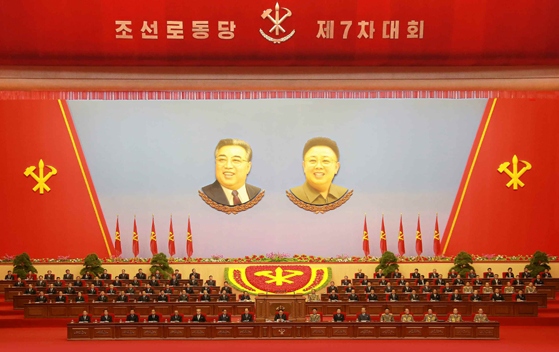
The 7th Congress of the Workers' Party of Korea (WPK) opened in Pyongyang on May 6, 2016. The Congress is the WPK's "supreme leadership organ" that "leads the Democratic People's Republic of Korea (DPRK)," Article 14, Clause 1 of its rules state. As such, the Congress is the most important political event in the life of the DPRK. The DPRK carries out all of its activities under the leadership of the Korean Workers' Party, Article 11 of the country's constitution points out.
The 7th Congress of the WPK was announced by the Central Committee of the WPK on April 27 towards the end of a successful nation-wide 70-day campaign to boost economic production, build new construction projects including new housing complexes and hydro-electric power dams, and other major infrastructure projects.
|
|
In his 2016 New Year address, DPRK leader Kim Jong Un announced that the WPK's 7th Congress "will proudly review the successes our Party has achieved in the revolution and construction under the wise guidance of the great leaders, and unfold an ambitious blueprint for hastening final victory for our revolution."
The 6th Congress of the WPK was held in Pyongyang in 1980.
In preparation for the Congress, the WPK held regional meetings throughout the DPRK in which the agenda was discussed and delegates were selected from various regions, sectors and institutions of the society. Rodong Sinmun, the newspaper of the Central Committee of the WPK pointed out that the regional conferences "elected and nominated as delegates and observers to the WPK Seventh Congress those officials and other party members, who have fully displayed their intense loyalty and patriotic devotion to the development of the Party and the building of a thriving nation..." Kim Jong Un himself was selected as a delegate of the Korean People's Army. Some 3,000 delegates in all representing all sectors of the DPRK are participating in theCongress which is setting the WPK's line of march for the next period.
The 7th Congress of the WPK is taking place at a time the DPRK is steadfastly defending its right to be in the face of constant U.S. imperialist threats of war and regime change and in the context of the disinformation spread by the imperialist media which presents the DPRK as an aggressor and not the victim of big power politics on the Korean peninsula. The DPRK, as a sovereign nation, is exercising it right to self-determination and independence which is the condition in which the people who live there are not beholden to or held captive by outside forces. Under the leadership and organization of the WPK, the people of the DPRK are still able to stick to their nation-building project despite the difficulties as a result of crippling sanctions imposed by the imperialists and Anglo-American manipulation of the UN Security Council. For this reason, reports indicate that the people have confidence in the leadership of Kim Jong Un and the WPK and are optimistic about the outcome of the 7th Congress.
On May 5, the eve of the Congress, Rodong Sinmun published an article entitled, "Korean-style Socialism Is Ever-victorious," on the occasion of the 25th anniversary of the publication of leader Kim Jong Il's work Our Socialism Centred on the Masses Shall Not Perish. The work deals with the inevitability of the victory of socialism which, the article points out, is "the secret of the strength and invincibility of Korean socialism and its intrinsic nature."
The article continues:
"Korean-style socialism has stood firm despite all severe adversities and the popular character of Korean-style socialism in which everything serves the people has been fully demonstrated for more than two decades since the publication of the work.
"Korean-style socialism has advanced along the road of victory without vacillation despite the anti-socialist moves of the imperialists and [it has] worked such historic miracles as bringing about epoch-making changes in all fields of politics, the military, the economy and culture, weathering the worst trials thanks to the strong ideological mainstay called the Juche idea.
"All the people are united closely around the leader in thinking and purpose, morality and sense of obligation and the whole society forms a great family in which all of them help and lead each other forward. This single-minded unity of the leader, party and masses is a specific character of Korean-style socialism hard to find in any other part of the world and the source of inexhaustible strength.
"Korean-style socialism is the life and soul of the people and the cradle of genuine life and happiness because under this system everything truly serves the people, giving the top priority to their interests.
"The present refugee crisis sweeping the world proves that any illusion about capitalism and choice of its path leads to self-destruction and the ideal and wishes of the popular masses can be translated into brilliant realities only under the socialist system."
Philippine Ruling Liberal Party
Set to Commit Election Fraud?
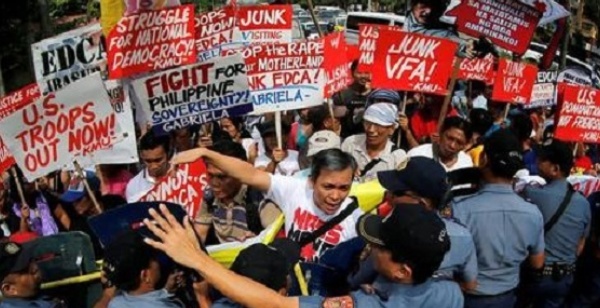
Protests outside U.S. Embassy in Philippines against presence of U.S.
troops.
Of the four major presidential candidates in the elections to be held on May 9, former Davao City Mayor Rodrigo R. Duterte is now widely considered the front-runner and most likely winner because he has topped all the major polls in April, performed well in presidential debates, and has gathered the biggest and most enthusiastic public meetings in all the regions of the Philippines.
He has surpassed his political rivals by strongly calling for change and castigating the Aquino government for corruption and condoning criminality, particularly the spread of prohibited drugs all over the country, down to the village level. He has impressed the public with his successful record of stamping out organized crime and delivering social services in his home city. He has endeared himself with his audiences by using populist street language and cursing the worst of the oligarchs.
He has surmounted accusations of having violated human rights in the course of suppressing criminal syndicates and having been too close to the Communist Party of the Philippines and the New People's Army which are strong in his home province. He has fended off the anti-communist attacks by asserting that he is a socialist and that he can be relied upon to negotiate and forge a just peace with the revolutionary forces as well as with the Muslim rebels within the framework of federalism.
He enjoys a high reputation for being clean and honest and for shunning corruption. But in the homestretch of the electoral campaign, Senator Antonio Trillanes, an attack dog of the corrupt Aquino government and a former naval officer and mutineer used fabricated bank records to misrepresent him as having accumulated hundreds of millions of pesos. The concerned Bank of the Philippine Islands as well as the Central Bank of the Philippines and the Anti-Money Laundering Council denied the authenticity of the forged documents.
Senator Grace Poe used to be the front-runner in the presidential campaign up to March. Her Independent Party was seen as critical of the Aquino government. It gained the support of the Rightist Nationalist People's Coalition and the Left Makabayan (Patriotic) Coalition. But Poe has not gone beyond criticizing only a few subordinates of the incumbent President Benigno S. Aquino III.
A number of times she has expressed the wish to continue the long-discredited hypocritical "straight path" policy of Aquino and to even make him her anti-corruption adviser should she win the presidency. Thus, Duterte was able to seize the initiative in categorically and vigorously opposing the Aquino government for its corruption, condoning of criminality and aggravation of unemployment and poverty in the Philippines.
Long before the electoral campaign period began on January 9, Vice President Jejomar Binay was the front-runner in poll surveys but eventually was weighed down by charges of corruption against him and other members of his immediate family in the government. He has gone down to the level of No. 3 in poll surveys. His political decline has been engineered by President Aquino himself to favor his friend and cabinet member Mar Roxas, previously head of the Department of Interior and Local Government.
But in the poll surveys and in terms of crowd attendance, Roxas has been a poor fourth place. He suffers from the traditional kiss of death of an outgoing discredited president. He is known for incompetence and mismanagement of the police forces. He is widely ridiculed for having himself photographed clumsily mimicking workers, like carrying a sack of rice or driving a pedicab, and for having no program to solve social and economic problems.
He boasts of having a high political pedigree, being the grandson of Manuel Roxas, the founder of the Liberal Party and the first president of the current Philippine puppet republic which was established in 1946 through grant of nominal independence by the US. The late Roxas had been a notorious puppet of the Japanese fascist invaders but was reinvented by General Douglas MacArthur as a double agent of the U.S. at the end of World War II in 1945.
Mar Roxas is also a scion of the big comprador and landlord Araneta family. He takes pride in having taken his economics degree from Wharton School. He is a dogmatic exponent of the neoliberal economic policy and like the current President Aquino wants to perpetuate the dominance of US multinational firms and U.S. military forces over the Philippines.
Despite the fact that Roxas rates low in major poll surveys and in gathering crowds, both he and President Aquino are confident of winning the presidential elections through electronic fraud. They can have the fake electoral results and there are fears of tampering of vote count machines in the country. The Commission on Elections is composed of Aquino appointees and headed by Andres Bautista, a cousin of Aquino and a former electoral campaign planner of Roxas.
While it is easy for Aquino, Roxas and the CIA to cheat in the presidential elections, they are playing with fire that can run out of their control. The electoral fraud will certainly ignite the outrage and resistance of the broad masses of people who are already suffering from severe exploitation and oppression and are desirous of revolutionary change. Armed resistance will arise from the millions of Duterte followers and are likely to ally themselves with the growing revolutionary forces and the Moro armies in Mindanao.
Prof. José Maria Sison is Chairperson of the International League of Peoples' Struggle.
(TeleSUR, May 6, 2016)
United Nations Humanitarian Coordinators Prepare
for
World
Summit in Turkey
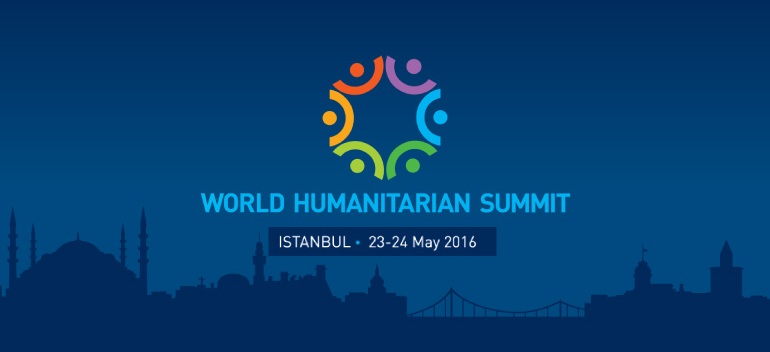
The UN News service carried the following item on
May
5.
***
As world leaders prepare to gather for a first-ever World Humanitarian Summit in Turkey later this month, the United Nations humanitarian coordinators for the Middle East and North Africa [on May 5] called on the international community to assume its responsibility in finding solutions to end the widespread conflict and humanitarian crises in the region.
"Millions of people in the Middle East and North Africa are enduring intolerable human suffering. Widespread violence, conflict and extremism in Iraq, Libya, Palestine, Syria and Yemen are creating immense humanitarian needs, with the impact felt beyond these countries' borders," the humanitarian coordinators said in a collective press release.
The call to action was issued by: Lise Grande, Humanitarian Coordinator for Iraq; Edward Kallon, Humanitarian Coordinator for Jordan; Philippe Lazzarini, Humanitarian Coordinator for Lebanon; Ali Al Za'tari, Humanitarian Coordinator for Libya; Robert Piper, Humanitarian Coordinator for the Occupied Palestinian Territory; Yacoub El Hillo, Humanitarian Coordinator for Syria; Kevin Kennedy, Regional Humanitarian Coordinator for the Syria Crisis; and Jamie McGoldrick, Humanitarian Coordinator for Yemen.
The officials underscored that 55 million people in the region currently need humanitarian assistance to ensure their basic survival.
"In other words, millions of girls, boys, women and men do not know where their next meal will come from," the coordinators emphasized.
"They lack access to essential health care, whether to give birth safely, receive treatment for chronic illnesses or protect children from preventable diseases. They are unable to access safe water and ensure basic hygiene. Those displaced from their homes lack adequate shelter, sometimes forced to sleep out in the open," they added.
Moreover, the officials stressed, millions of families "do not sleep at night worrying about where the next bomb or mortar might fall and whether their loved ones will be caught in the cross-fire between warring parties or bear the brunt of extreme violence."
"We have a shared responsibility to end this tragedy and preserve people's basic dignity. Our humanity demands no less," they said.
The officials said that in the lead-up to the World Humanitarian Summit, they consulted and listened to thousands of voices in the region.
"Their feelings and demands were clear: outrage at the staggering level of human casualties and suffering being witnessed and felt on a daily basis; disbelief in the lack of accountability for clear violations of international humanitarian and human rights law; disappointment in the humanitarian system for failing to support and strengthen local response capacity; and conviction that humanitarian aid cannot be a substitute for political action that addresses the root causes of people's suffering," the humanitarian coordinators said.
Calling on global leaders to attend the Summit and "make it a success," the coordinators emphasized that actions should include listening to the voices of the region and taking the bold decisions that will effect change.
"Leaders must assume their responsibility to find political solutions to end bloodshed, and prevent further suffering. States and other actors need to respect the rules of war and hold accountable those who do not," they stressed.
In addition, the humanitarian community also has the responsibility to empower and protect the most vulnerable and treat all people with dignity, the coordinators said.
"We accept the challenge of working differently so as to end the need for aid and handouts, build resilience and enhance the role and capacity of local responders," they said.
"As time ticks towards the Summit, it runs out every day for millions of affected people in the region. They have no choice. We do: humanity," they added.
New U.S. NATO Commander in Europe
U.S. General Curtis Scaparotti was appointed Commander of NATO's armed forces in Europe in a May 4 ceremony at the alliance's Supreme Headquarters Allied Powers Europe (SHAPE) in Mons, Belgium.
There in his first speech Scaparrotti said Russia was among NATO's main security challenges. He noted, in particular, that NATO would continue to maintain its strategy of deterrence towards Russia. He called for NATO members to get prepared to take military action against Russia. They must be able "to fight tonight," if "deterrence" fails, he said. He specifically called for "supporting Ukraine with what it needs and to look into what weapons suit it best."
Scaparrotti replaced U.S. General Philip Breedlove and becomes the 18th U.S. officer to hold the post. Scaparotti was formerly Commander of U.S. and south Korean forces in the Republic of Korea.
Statement by Cuban National Association of Small Farmers on U.S. Government Measure
 On April 22, the U.S. State Department announced the
decision to include coffee on the list of Cuban products produced
by the non-state sector which could be imported into that
country. This is a continuation of a measure adopted by the
government of the United States in February 2015, authorizing
very limited Cuban exports, which excluded all goods and services
produced by state enterprises.
On April 22, the U.S. State Department announced the
decision to include coffee on the list of Cuban products produced
by the non-state sector which could be imported into that
country. This is a continuation of a measure adopted by the
government of the United States in February 2015, authorizing
very limited Cuban exports, which excluded all goods and services
produced by state enterprises.
It is striking that in announcing the measure, the State Department clarifies that importers "must obtain documentary evidence that demonstrates the entrepreneur's independent status," and notes that "This is another measure intended to support the ability of the Cuban people to gain greater control over their own lives and determine their country's future."
What the State Department fails to say is that having unilaterally stripped Cuba of its previous treatment as the most-favoured nation -- after decreeing the blockade -- a position rightfully ours as a founding state of the World Trade Organization, in order to export any Cuban product to the United States, higher customs duties must be paid, which make their import to this country practically impossible.
The State Department also ignores the fact that the Agrarian Reform Law, enacted after the triumph of the Revolution in 1959, made more than 200,000 peasant families land owners, and that the Cuban state has since implemented a program for the productive, economic and social development of the rural population of our country and ensured production assistance, access to credit, a secure market for their produce and other social benefits.
No one should believe that a Cuban small farmer can directly export to the United States. For this to be possible, Cuban foreign trade enterprises must participate and financial transactions need to be in U.S. dollars, issues which so far have not been settled.
We are conscious that the objective of these measures is to influence Cuban farmers and separate them from our state.
Cuban small farmers do not fear changes, provided they are of our own making. This is the powerful reason why the continued aim of the government of the United States to destroy the unity of the people of Cuba can not be permitted, as this would destroy a revolutionary process that has provided us with a participatory democracy, freedom, sovereignty and independence.
Cuban farmers are members of this socialist civil society and exist as part of the state, which represents the power of the people, and not in opposition to it. Together with the workers and all our people, we face the imperialist policy objective of promoting the division and disintegration of Cuban society, which is what is intended with a measure such as that recently announced.
If the government of the United States really wants to contribute to the welfare of Cubans, what it must do is definitively lift the economic, commercial and financial blockade imposed for more than 50 years, which is the main obstacle to the development of Cuba.
Cuban farmers reaffirm our loyalty to our revolutionary state against all risks and challenges, and will continue to build a prosperous and sustainable socialism, with all and for the good of all, with the patriotic commitment to continue producing for the people.
|
Website: www.cpcml.ca Email: editor@cpcml.ca

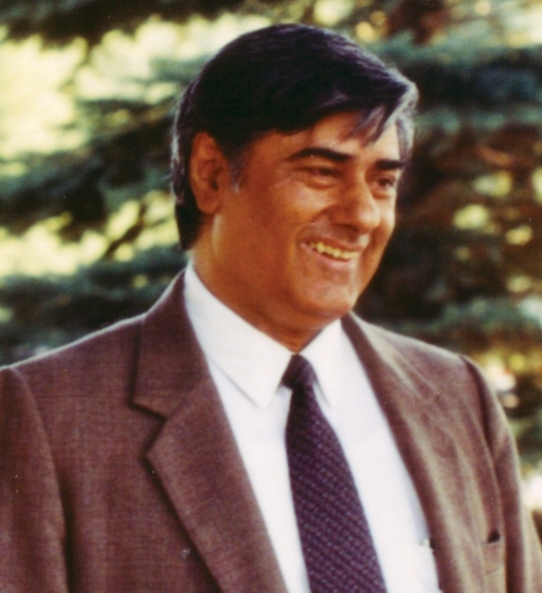
 "[The Internationalists]
provided a framework
through
which everyone's word and deed could shine, realizing the tasks
set for that period. This meant that as a way of life, all those
in whose interest it was to make the decisions in the course of
realizing their aims were mobilized. A modern way of doing things
was established, linking the organization with the content, words
with deeds, the individual to the highest responsibility of
ensuring that nothing passes by without his/her scrutiny. A truly
revolutionary and Marxist-Leninist organization was created by
the individuals who wished for nothing else but the victory of
the working class in its historic march for emancipation. A
qualitative change took place, in both the spheres of
consciousness and organization. This change was consistent with
the concrete conditions and deserving of those who prided
themselves for being members of the vanguard organization of the
working class.
"[The Internationalists]
provided a framework
through
which everyone's word and deed could shine, realizing the tasks
set for that period. This meant that as a way of life, all those
in whose interest it was to make the decisions in the course of
realizing their aims were mobilized. A modern way of doing things
was established, linking the organization with the content, words
with deeds, the individual to the highest responsibility of
ensuring that nothing passes by without his/her scrutiny. A truly
revolutionary and Marxist-Leninist organization was created by
the individuals who wished for nothing else but the victory of
the working class in its historic march for emancipation. A
qualitative change took place, in both the spheres of
consciousness and organization. This change was consistent with
the concrete conditions and deserving of those who prided
themselves for being members of the vanguard organization of the
working class.
 In 2014, before oil prices
collapsed, nearly 230,000 people
were directly employed in the oil and gas industry in Canada.
About 160,000 of these workers lived in Alberta, 10,600 in
British Columbia, 12,400 in Saskatchewan and 17,000 in the rest
of Canada.
In 2014, before oil prices
collapsed, nearly 230,000 people
were directly employed in the oil and gas industry in Canada.
About 160,000 of these workers lived in Alberta, 10,600 in
British Columbia, 12,400 in Saskatchewan and 17,000 in the rest
of Canada.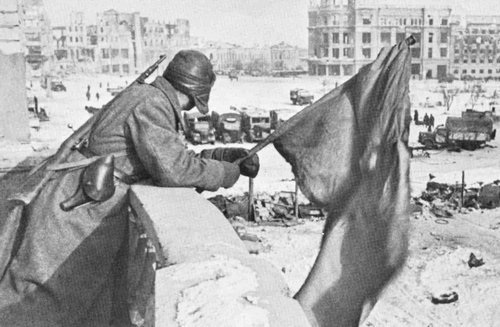 Soviet
soldier
waves
the
red
banner
of
victory
on
February
2,
1943 after the German surrender at the Battle of
Stalingrad.
Soviet
soldier
waves
the
red
banner
of
victory
on
February
2,
1943 after the German surrender at the Battle of
Stalingrad. 